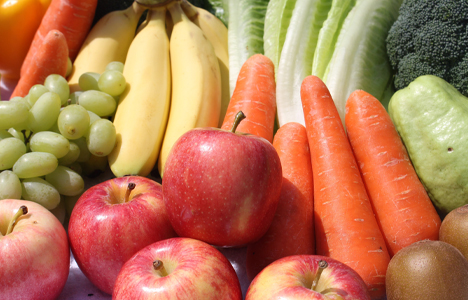Natural Defense: Powerful Remedies to
Boost Your Immune System and Guard Against Colds and Flu
by Mark J Kaylor
As we head into the colder months, the risk of colds and flu becomes a concern for many. A resilient immune system is our first line of defense against respiratory infections. In this guide, we’ll explore how diet, lifestyle choices, quality sleep, regular exercise, and specific nutrients and herbal remedies like vitamin D, vitamin C, selenium, zinc, propolis, Wellmune beta-glucan, Reishi, Maitake, and Ginseng can help fortify our defenses against pathogens. Discover how these natural strategies can help keep you healthy and energized all season.
1. Diet and Nutrition: Fueling Immunity from the Inside Out
 A balanced diet is critical for maintaining optimal immune function. Fruits and vegetables are foundational, providing essential vitamins, minerals, antioxidants, and phytonutrients that support the immune system. Citrus fruits like oranges, lemons, and grapefruits are rich in vitamin C, known to enhance white blood cell activity and improve respiratory health. Berries like blueberries and strawberries contain anthocyanins, powerful antioxidants that protect cells from damage caused by pathogens. Leafy greens such as spinach and kale are packed with beta-carotene and vitamin E, both of which play roles in immune response and inflammation reduction.
A balanced diet is critical for maintaining optimal immune function. Fruits and vegetables are foundational, providing essential vitamins, minerals, antioxidants, and phytonutrients that support the immune system. Citrus fruits like oranges, lemons, and grapefruits are rich in vitamin C, known to enhance white blood cell activity and improve respiratory health. Berries like blueberries and strawberries contain anthocyanins, powerful antioxidants that protect cells from damage caused by pathogens. Leafy greens such as spinach and kale are packed with beta-carotene and vitamin E, both of which play roles in immune response and inflammation reduction.
Healthy fats from sources like fish, flaxseeds, and walnuts provide omega-3 fatty acids, which reduce inflammation and support cell membranes, enhancing the ability of immune cells to communicate and coordinate effectively. Protein is another crucial component, as amino acids are the building blocks for immune cells and antibodies. Lean meats, legumes, and nuts are excellent sources of high-quality protein. Additionally, herbs and spices such as ginger, garlic, turmeric, and onions contain bioactive compounds with antibacterial and antiviral properties, providing an extra layer of defense for respiratory health.
2. Lifestyle Choices: Simple Habits for Long-Term Immunity
Our daily habits can have a profound impact on immune health. Stress management is essential because chronic stress weakens the immune response, making the body more vulnerable to infections. Practices like mindfulness meditation, deep breathing exercises, and yoga have been shown to lower cortisol levels, helping to mitigate stress and bolster immune resilience. Hydration is another key factor, as water and herbal teas support mucous membranes, which serve as a barrier to pathogens entering the respiratory tract. It’s recommended to drink at least eight glasses of water per day to maintain optimal hydration.
Avoiding smoking and limiting alcohol consumption can significantly benefit immune function. Smoking damages respiratory tract tissues, making it easier for pathogens to take hold, while excessive alcohol suppresses immune cell activity. By making these lifestyle adjustments, we create a supportive environment for our immune system to operate at its best.
3. The Role of Sleep in Immune Resilience
Adequate, high-quality sleep (typically 7-8 hours per night) is critical for immune health. During sleep, the body produces and releases cytokines, proteins that target infection and inflammation. Studies have shown that sleep-deprived individuals are more susceptible to colds and flu, as their bodies produce fewer cytokines and infection-fighting antibodies. To improve sleep quality, maintain a consistent sleep schedule, create a cool, dark sleeping environment, and limit screen exposure before bed. Adequate sleep not only strengthens immunity but also enhances the body’s ability to respond to infection more efficiently.
4. Exercise: A Vital Boost for Immune Function
 Moderate exercise has been shown to benefit the immune system by promoting healthy circulation and improving the efficiency of immune cell function. Activities like brisk walking, cycling, swimming, and yoga (for at least 30 minutes on most days) help reduce inflammation and enhance immune surveillance, enabling immune cells to detect and fight off pathogens more effectively. However, it’s worth noting that intense or prolonged physical activity may temporarily suppress immune function, so maintaining balance is key to reaping the benefits of exercise without overtaxing the body.
Moderate exercise has been shown to benefit the immune system by promoting healthy circulation and improving the efficiency of immune cell function. Activities like brisk walking, cycling, swimming, and yoga (for at least 30 minutes on most days) help reduce inflammation and enhance immune surveillance, enabling immune cells to detect and fight off pathogens more effectively. However, it’s worth noting that intense or prolonged physical activity may temporarily suppress immune function, so maintaining balance is key to reaping the benefits of exercise without overtaxing the body.
5. Key Nutrients for Immune Health
Vitamin D: The Sunshine Vitamin with Protective Power
Vitamin D is a crucial component of immune health, influencing both the innate and adaptive immune responses. Research has shown that individuals with low vitamin D levels are more susceptible to respiratory infections. Vitamin D helps modulate the immune response, reducing inflammation and promoting the activation of T cells, which fight off viruses and bacteria. Natural sources of vitamin D include sunlight exposure, fatty fish, and fortified dairy products. However, during the winter months, a supplement may be necessary to maintain optimal levels. The recommended dose ranges from 1,000 to 2,000 IU daily, though individual needs may vary.
Vitamin C: An Antioxidant Ally for Immunity
Vitamin C is a well-known immune booster and potent antioxidant, protecting immune cells from oxidative damage. It enhances the production of white blood cells and improves their effectiveness in combating pathogens, particularly in the respiratory system. Sources of vitamin C include citrus fruits, bell peppers, kiwi, and broccoli. For those prone to respiratory infections, a daily intake of 500-1,000 mg of vitamin C may help reduce the duration and severity of symptoms.
Selenium: Supporting Immune Defenses at the Cellular Level
Selenium plays a key role in antioxidant defenses and supports immune cell function, especially in fighting viruses. It helps produce glutathione peroxidase, an enzyme that protects immune cells from oxidative stress. Selenium-rich foods include Brazil nuts (one nut provides a daily dose), seafood, and sunflower seeds. Optimal selenium intake not only supports immunity but also helps lower inflammation in the respiratory system.
Zinc: A Crucial Mineral for Immune Cell Function
Zinc is essential for immune cell development and function, and it has been shown to reduce the duration of the common cold when taken at the onset of symptoms. Zinc supports both innate and adaptive immunity by enhancing white blood cell activity. Shellfish, meat, pumpkin seeds, and fortified cereals are good sources of zinc. Daily intake recommendations vary, but for those with recurrent colds, a dose of 15-30 mg per day may help strengthen immune defenses.
6. Propolis: Nature’s Protective Resin
 Propolis, a resinous substance produced by bees, has long been valued for its antimicrobial, antiviral, and anti-inflammatory properties. Studies suggest that propolis can effectively combat respiratory pathogens, making it particularly useful during cold and flu season. There are different types of propolis (green, brown, and red), each with unique benefits. For example, red propolis is particularly potent against drug-resistant bacteria and fungi. Propolis can be taken as a supplement, tincture, or spray, providing an extra layer of immune support.
Propolis, a resinous substance produced by bees, has long been valued for its antimicrobial, antiviral, and anti-inflammatory properties. Studies suggest that propolis can effectively combat respiratory pathogens, making it particularly useful during cold and flu season. There are different types of propolis (green, brown, and red), each with unique benefits. For example, red propolis is particularly potent against drug-resistant bacteria and fungi. Propolis can be taken as a supplement, tincture, or spray, providing an extra layer of immune support.
7. Wellmune Beta-Glucan: An Immune-Modulating Powerhouse
Derived from baker’s yeast, Wellmune beta-glucan is a natural compound with immune-enhancing properties. Wellmune works by priming immune cells, allowing them to respond more quickly to infections. Studies have shown that it can help reduce cold symptoms and enhance respiratory health. A daily dose of 250 mg of Wellmune beta-glucan can be beneficial during flu season or periods of high stress, helping to bolster immune defenses and reduce the frequency of illness.
8. Medicinal Mushrooms: Reishi and Maitake for Respiratory Health
Medicinal mushrooms like Reishi and Maitake are renowned for their immune-boosting properties. Reishi, often referred to as the “mushroom of immortality,” acts as an adaptogen, helping the body manage stress and enhancing immune function. Reishi contains beta-glucans and polysaccharides, which stimulate immune cell activity and promote cytokine production. Maitake, on the other hand, is rich in D-fraction polysaccharides that directly support the immune system’s ability to ward off respiratory infections. Both mushrooms can be consumed as capsules, powders, or teas, making them versatile additions to any immune-boosting regimen.
9. Ginseng: A traditional Immune Modulator
Ginseng, particularly Asian (Panax) and American varieties, has a long history in traditional medicine as an immune modulator and respiratory health enhancer. Studies show that ginseng extracts can reduce the severity and frequency of respiratory infections. Ginseng works by balancing immune responses and boosting energy levels, making it ideal during times of stress and fatigue. A daily dose of 200-400 mg of standardized ginseng extract during the flu season or at the onset of symptoms may offer substantial immune benefits.
Building Your Immune Shield: Small Steps for Big Health Benefits
By incorporating these natural remedies into your daily routine, you can build a resilient immune system that is well-equipped to handle the challenges of cold and flu season. A balanced diet, healthy lifestyle habits, quality sleep, moderate exercise, and targeted supplementation with key vitamins, minerals, and immune-supporting herbs can make all the difference in staying healthy and energized. Take charge of your immunity today to enjoy a healthier tomorrow.
References
- Gombart, A. F., Pierre, A., & Maggini, S. (2020). A Review of Micronutrients and the Immune System–Working in Harmony to Reduce the Risk of Infection. Nutrients, 12(1), 236.
- Tan, C. W., et al. (2020). Vitamin D and SARS-CoV-2 infection: SARS-CoV-2 infection and immunity. Journal of Clinical Endocrinology & Metabolism, 105(10), dgaa637.
- Negrut, N., et al. (2021). Beta-glucan’s properties for application in various medical conditions and possible future directions. Journal of Immunology Research, 2021, 2468063.
- Patel, S., & Goyal, A. (2020). Propolis as a natural remedy: A review of its antibacterial properties and efficacy in treating respiratory infections. Journal of Natural Products, 83(6), 2022–2030.
- Chang, Y. S., et al. (2019). Review on the pharmacological actions of Ginseng for respiratory health. Journal of Ginseng Research, 43(2), 210–221.
Mark J. Kaylor is a passionate advocate for holistic health and natural remedies, with a focus on extending both lifespan and healthspan. As the founder of the Radiant Health Project and host of Radiant Health Podcast, Mark blends in-depth research with traditional wisdom to empower others on their journey to vibrant health. Through his writing and speaking, he shares insights into the transformative power of herbs, nutrition, and lifestyle practices.
Disclaimer: All information and results stated here is for educational and entertainment purposes only. The information mentioned here is not specific medical advice for any individual and is not intended to be used for self-diagnosis or treatment. This content should not substitute medical advice from a health professional. Always consult your health practitioner regarding any health or medical conditions.




